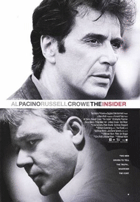 Director: Michael Mann
Director: Michael Mann
Duration: 157 minutes
Year: 1999
Key words: Tobacco industry, corporate behaviour, smoking, tobacco, news media
Summary: Jeff Wigand, a former research scientist for a US tobacco company, exposes industry secrets to a TV news show (based largely on true events).
Degree of public health theme coverage: The movie covers the major public health issue of corporate power in relation to a hazardous product – tobacco. The company involved uses many tactics to protect its activities eg, confidentiality agreements with staff, legal threats, misleading the US government (testifying on nicotine addiction). Other public health issues include:
- Aspects of tobacco product composition and design (to improve nicotine delivery) and lack of tobacco industry concern about hazardous constituents when profits might be threatened. A contrast is given of the CEO of another company Johnson and Johnson, who recalled all their pain killer products from the market and developed a safety cap.
- The issues around being a whistleblower on a health issue (especially the potential personal costs).
- The actions of US states against the tobacco industry.
- The role of investigative journalism in exposing public health issues (including how corporate pressures can be involved).
Score=3/5
Sophistication of analysis of public health content: The movie covers many different aspects of corporate behaviour and investigative journalism. This seems to be done in a fairly nuanced and realistic way. Score=3/5
Potential for empowerment and use of advocacy: The value of investigative journalism and a free media for exposing threats to health is well covered. Nevertheless the movie raised the question of whether or not the mainstream media was free to act in the public's interest (given possible corporate influence).
The importance of whistleblower action by those from industry is shown. This whistleblower was able to provide information to the media and also in a major court case involving the state of Mississippi against the tobacco industry. Nevertheless, the personal costs to the whistleblower are portrayed as being fairly severe. Score=4/5
Persuasiveness of the movie: The movie seems very persuasive and this is enhanced by the knowledge that it is based on real events. The whistleblower and the investigative journalist were well characterised (including their relationships with each other, with their families, their fears, and their sense of responsibility for revealing the truth). Score=4/5
Engagement and cinematic quality: The movie is very well acted and is gripping (with aspects of a thriller). The tension and dramatic scenes do not seem overdone and fit with the overall story. Score=5/5
Total score = 19/25
Questions for discussion:
- Do you think that the corporate behaviour shown in this movie is realistic and widespread amongst companies that produce products that can be hazardous to health?
- Do you think that the movie realistically deals with investigative journalism and how the media work?
Other information:
- Bonus material on the DVD is available and it includes the real Jeffrey Wigand and Lowell Bergman.
- There are two publications that refer to this movie:
- Dixon HG, Hill DJ, Borland R, Paxton SJ. Public reaction to the portrayal of the tobacco industry in the film The Insider. Tobacco Control 2001;10:285-91. Full free text at: http://www.pubmedcentral.nih.gov/articlerender.fcgi?tool=pubmed&pubmedid=11544395
- Wigand J. The Insider: its effect on the public. Tobacco Control 2001;10:292. Full free text at: http://www.pubmedcentral.nih.gov/articlerender.fcgi?tool=pubmed&pubmedid=11544396
- There is a Wikipedia article on this movie - found here
- There is also a Wikipedia article on Jeffrey Wigand (who was the whistleblower in the movie) - found here
- The original magazine article “The Man Who Knew Too Much” is also referred to in a Wikipedia article - found here
- The trailer can be seen on YouTube - found here
- Back to Films in Undergraduate Public Health Teaching home page
CONTACT US
Associate Professor Nick Wilson
Department of Public Health
University of Otago, Wellington
PO Box 7343
Wellington South 6242
New Zealand
Tel: +64 4 385 5541 ext 6469
Fax: +64 4 389 5319
Email: nick.wilson@otago.ac.nz